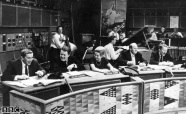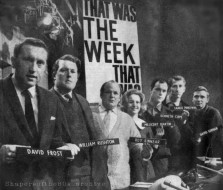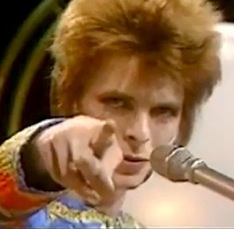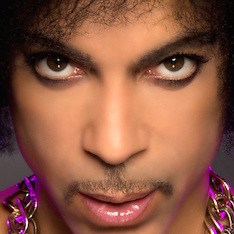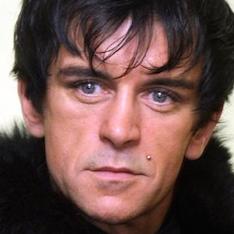➤ David Frost salutes TW3, the shocker that pioneered satire 50 years ago tonight
Posted on November 24, 2012
❚ THE MOST INFLUENTIAL TV SERIES in British history – the lodestar for all future comedy, and more – won no fulsome retrospective from the BBC on its 50th anniversary today. Only a brief item on the Today show reminded us how the earth tilted at 10:30pm on this night in 1962 with the launch of TW3 – the adopted shorthand for That Was The Week That Was. New research reveals that this politically insolent television voice of Britain’s nascent satire movement attracted complaints by the thousand. “No other programme has so many files in its correspondence section,” we were told this morning by historian Morgan Daniels on the Today programme. What it had done, according to Private Eye’s first editor Christopher Booker in his landmark 1969 book The Neophiliacs, was finally to break free from the Presbyterian straitjacket of Lord Reith, the BBC’s founder. Within weeks pubs started emptying on Saturdays as the nation made a ritual of rushing home to catch TW3’s 37 broadcasts which grew an audience of 12 million in less than a year.
A galaxy of leading “Northern Realist” writers and national newspaper journalists contributed razor-sharp sketches and what little remains available on video makes today’s comedy seem lily-livered. TW3 made the career of Sir David Frost who was its “classless” front-man at the age of 23. Though many satirists say they achieve no lasting change, on tonight’s Loose Ends radio show, Frost insisted that satire does have a knock-on influence in its day, even if it may not reform legislation in the long term. TW3’s second series was curtailed on December 28, 1963, for fears it would unbalance the general election campaign of 1964.
TW3 captured a zeitgeist unique to the 60s before they began to swing. Booker argued in The Neophiliacs: “It was a final drawing together of almost all those threads which had been working for ‘revolution’ and sensation in the England of the previous seven years.” [Namely, since the election of 1955 when slippage of the tectonic plates supporting Britain’s centuries-old class system saw the subsequent rise of the “unposh” intellectual and of John Osborne’s “angry young man”] … “[TW3] brought the destructive force of the satire craze to a mass audience.”
Britain was changing. Deference was on the way out, The Beatles were on their way in. The satire boom was in full swing, propelled by the 1960 theatre revue Beyond the Fringe which made stars of Peter Cook, Jonathan Miller, Alan Bennett and Dudley Moore on both sides of the Atlantic… Booker’s fortnightly satirical magazine Private Eye launched in 1961, along with a savage cabaret at Peter Cook’s Establishment club which became the talk of Soho. Their targets were the institutions that hitherto few dared to criticise: government, monarchy, class, the church, the military, the professions… incompetence, inefficiency, corruption and self-importance generally in the prevailing social order.
Meanwhile the BBC had seen the arrival of a new director-general, Hugh Carleton-Greene, determined to sharpen up the Corporation’s output. Keen to move away from the cosiness epitomised in the early evening news magazine Tonight, he put one of its producers, Ned Sherrin, in charge of creating a late-night show designed to “prick the pomposity of public figures”.
TW3 was a live, free-form show that broke the rules, with its cameras, crew and studio audience all in view. In the UK’s two-channel era before 24-hour broadcasting, the open-ended show closed the night’s schedule and often over-ran its allotted hour. Each week it was introduced by Millicent Martin belting out the theme tune, the words altered to reflect the week’s news, before going into a topical monologue by host David Frost and then onto a series of sketches, invective from the journalist Bernard Levin, songs, cartoons drawn live, monologues and studio debate. Its fodder included prime ministers Macmillan and Home and the Profumo Affair which destroyed the fortunes of the Secretary of State for War.
Most famously, TW3 excelled the night after the shocking assassination of American President John F Kennedy in 1963 with an impromptu tribute that was as respectful as it was powerful. This was screened a day later by NBC in the States. Its highlight was the song In the Summer of His Years by Herbert Kretzmer, which went on to be a hit for Connie Francis, Mahalia Jackson and Sarah Vaughan, among others. Democrat Senator Hubert Humphrey asked that the full script be printed in the Congressional record.
Critics of the TV series damned it as “infantile”, “smutty” and “dreary” while the Daily Mail praised its “awesome impregnable vitality”. In what became a golden age for thoughtful British television, the BBC’s young rebel executives associated with TW3, Donald Baverstock and Alasdair Milne, became controller of programmes and director-general respectively.
In the Telegraph last week Christopher Booker wrote: “The wider legacy of TW3 was that it marked the beginning of a profound shift in the culture and values of the BBC. TW3 ushered it into a less reverential age, since when we have become accustomed to its coverage being dictated by a Left-of-centre party line on pretty well every issue of the day.”
Compare and contrast the satirists of the 60s and their targets with the “alternative comics” of Alexei Sayle’s generation in the 80s when they formed the Comic Strip
➢ Click through for an analysis by Shapersofthe80s
from 1980
❏ TW3 performers included Timothy Birdsall, Kenneth Cope, David Frost, David Kernan, Roy Kinnear, Bernard Levin, Millicent Martin, Lance Percival and William Rushton.
❏ TW3 writers included John Antrobus, John Betjeman, John Bird, Christopher Booker, John Braine, Graham Chapman, John Cleese, Peter Cook, Roald Dahl, Michael Frayn, Richard Ingrams, Gerald Kaufman, Herbert Kretzmer, Frank Muir, Denis Norden, Dennis Potter, Jack Rosenthal, Peter Shaffer, Peter Tinniswood, Kenneth Tynan, and Keith Waterhouse.
All text © 2012 Shapersofthe80s
CLICK ANY PIC TO LAUNCH TW3 CAROUSEL:
VINTAGE BEST BITS FROM TW3
❏ Year-ending round-up of TW3 highlights, Dec 1963 – includes notorious Mississippi number with black-and-white minstrels in the week a white protester walking from Alabama to Jackson was shot dead by the road … The consumer guide to religion … Timothy Birdsall draws the Duke and Duchess of Eastbourne … MPs who have not spoken in Parliament are named and shamed … Bernard Levin harangues a pride of lawyers with their failings.
❏ Tribute to JFK, 1963 – Excerpt from the 20-minute edition of TW3, broadcast Nov 23, 1963, the day after the President’s assassination.
❏ The infamous punch-up – Desmond Leslie assaults Bernard Levin after Levin had allegedly insulted Leslie’s wife, Agnes Bernelle the actress, in a review he’d written.
➢ View Confession, by John Braine – “It’s a strange twilight world I live in. I am a heterosexual.” Kenneth Cope echoes the arch vocabulary of confessional TV documentaries on taboo topics in the 60s.
➢ View This Is Your Life, Henry Brooke – A 1963 TW3 spoof invites then-Home Secretary Henry Brooke to hang himself with his own words.
➢ View half a minute of Frankie Howerd, the veteran comic whose career TW3 resurrected in 1963
➢ View a 40th anniversary compilation of TW3 highlights, in six parts at YouTube
❏ The Mother’s Day monologue can be credited with putting the phrase “2.4 children” into everyday speech in 1963. A definition for What Is a Mum? was montaged together from the advertising slogans and characters in TV commercials that enslaved humble citizens in the new consumer society of the 60s…
“ A Mum lives with a Dad and 2.4 children in a rented house where the neighbours notice her washing on the line. A Mum relies upon secret ingredients and instant cake mixes. She has kids with dirty teeth who regularly shout “Don’t forget the Fruit Gums, Mum”. A Mum is full of faith. She thinks every wash day is a miracle. And since she adds the extra egg to everything except the bacon, she is probably constipated as well… A Mum goes to Butlins and worries about dandruff. And sometimes the poor soul feels run down and lacking in energy. Then, she’s so confused that if she gets a fever of a 100 she thinks she is feeling one degree under. I know why. Her old man bashes her about because every time he comes home tired and famished she tells him that a little cube of beef stock is a real man’s meal. ” [Excerpted from Mother’s Day by David Nathan and Dennis Potter]






